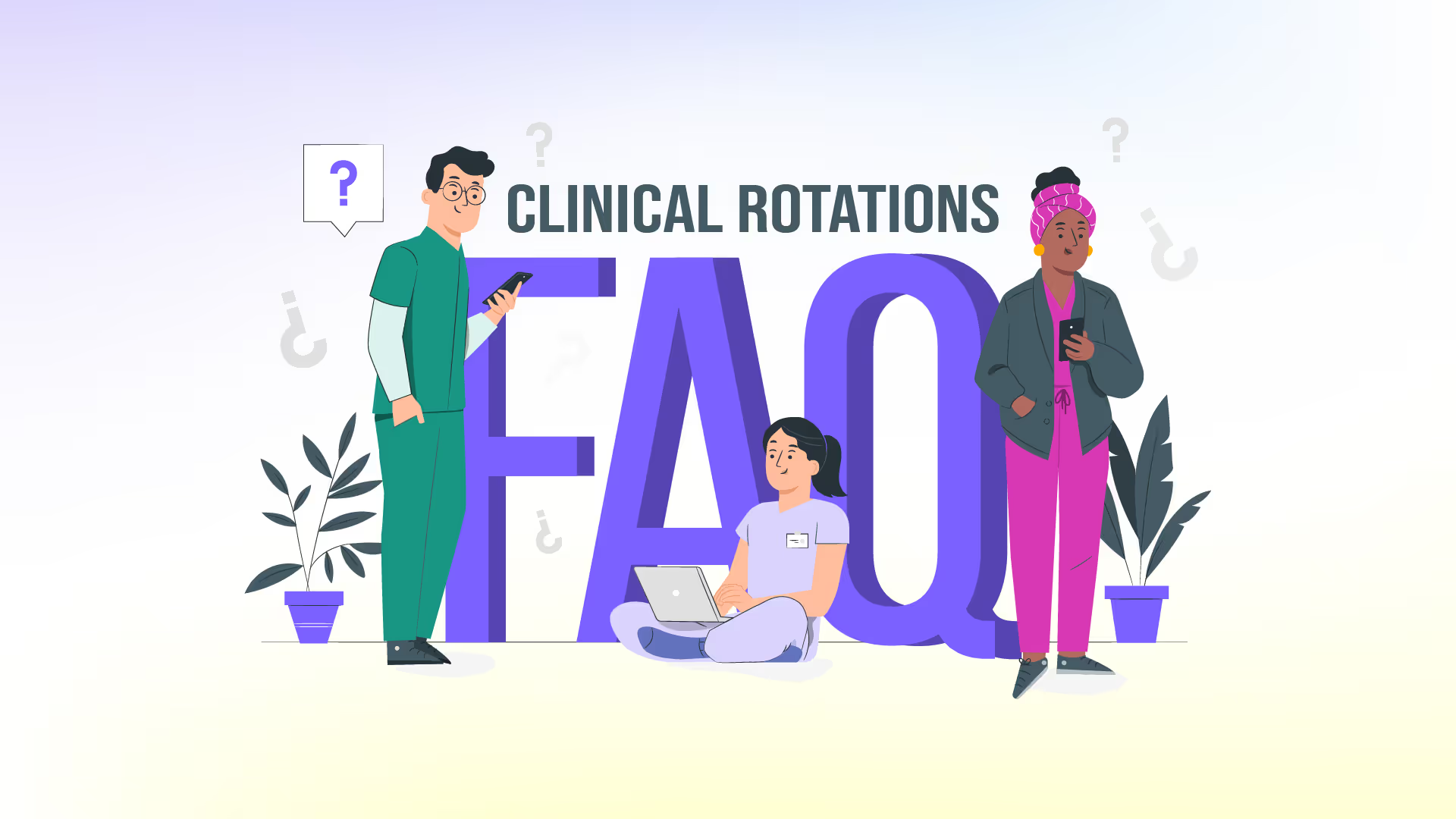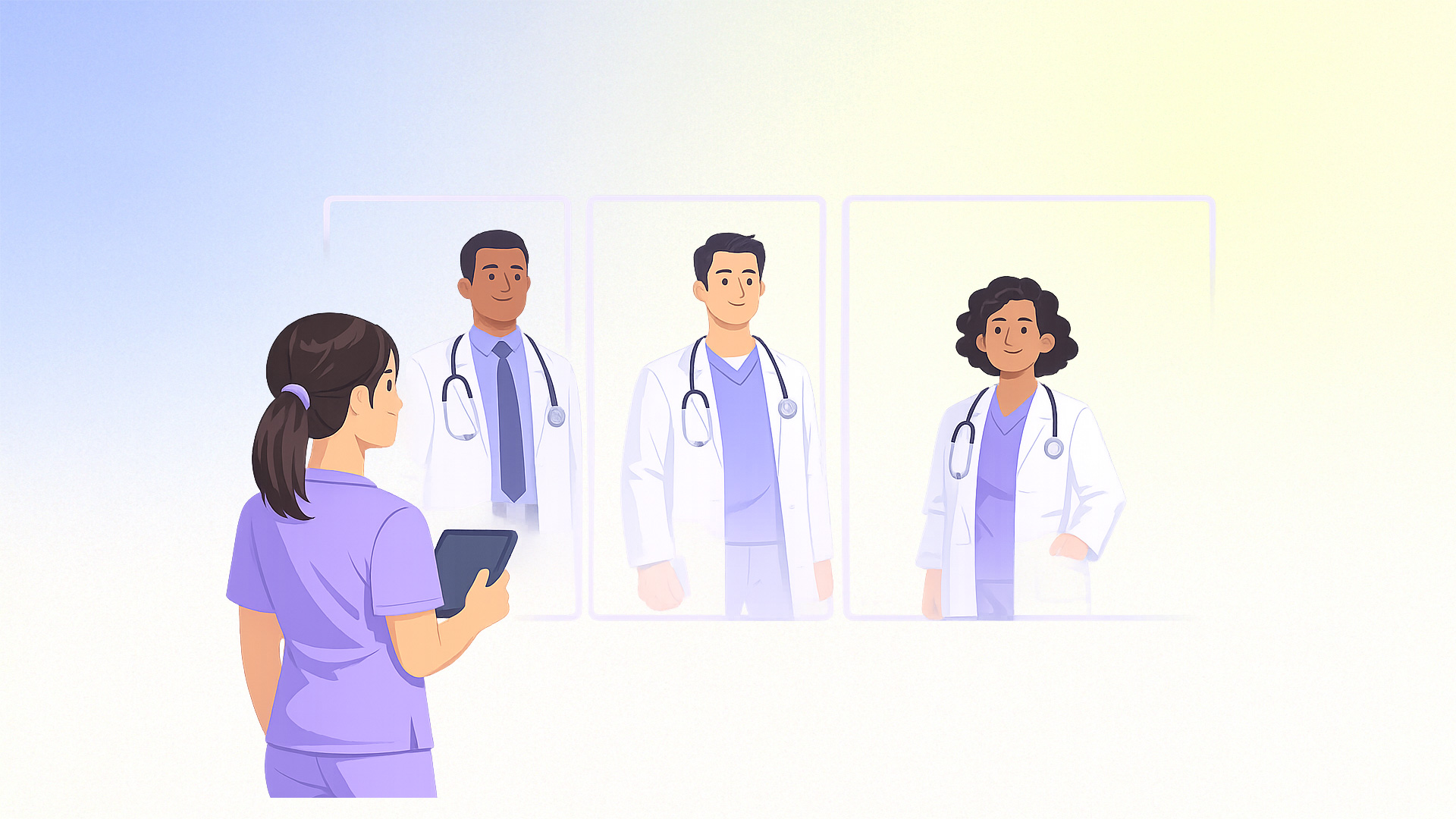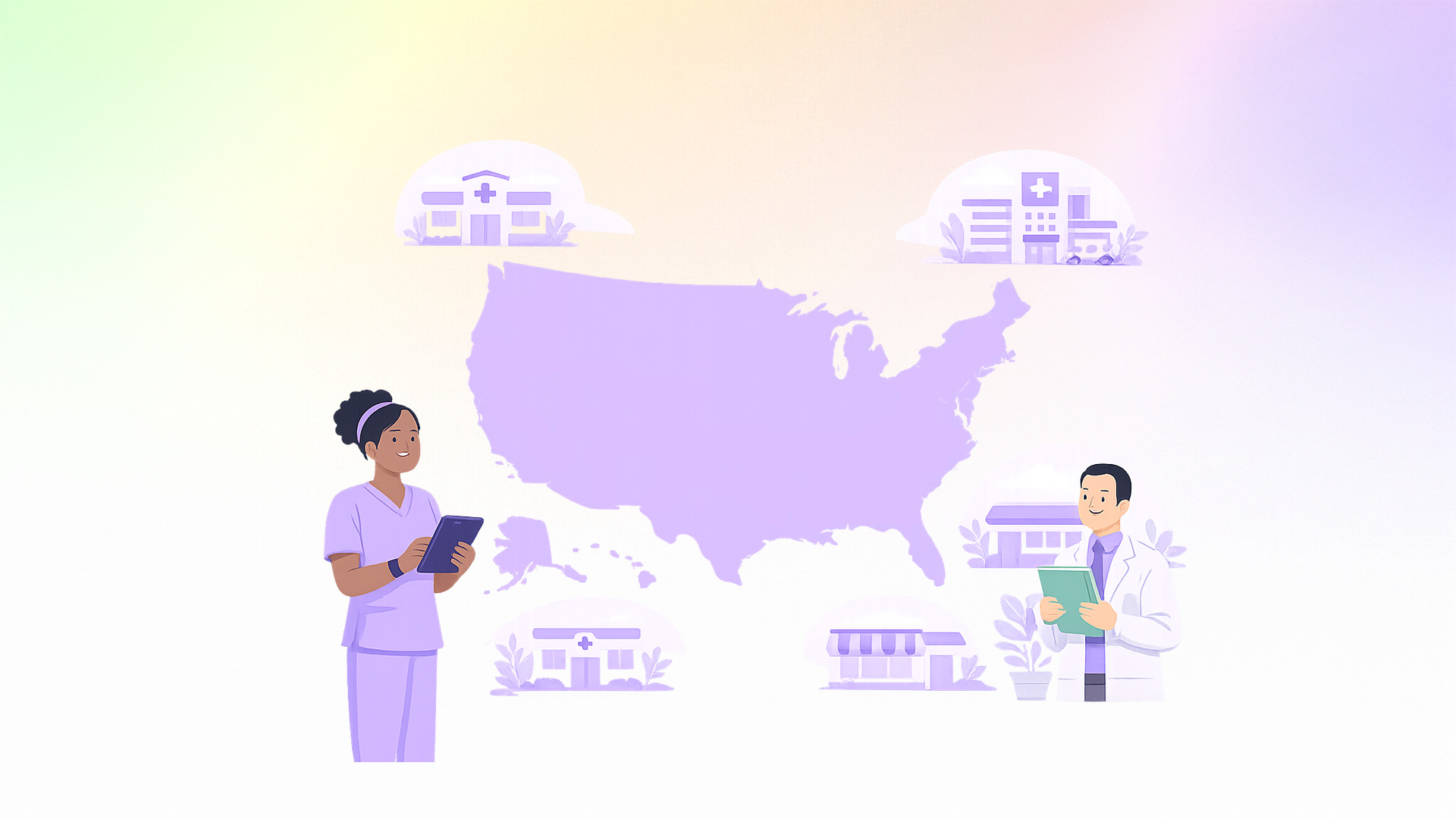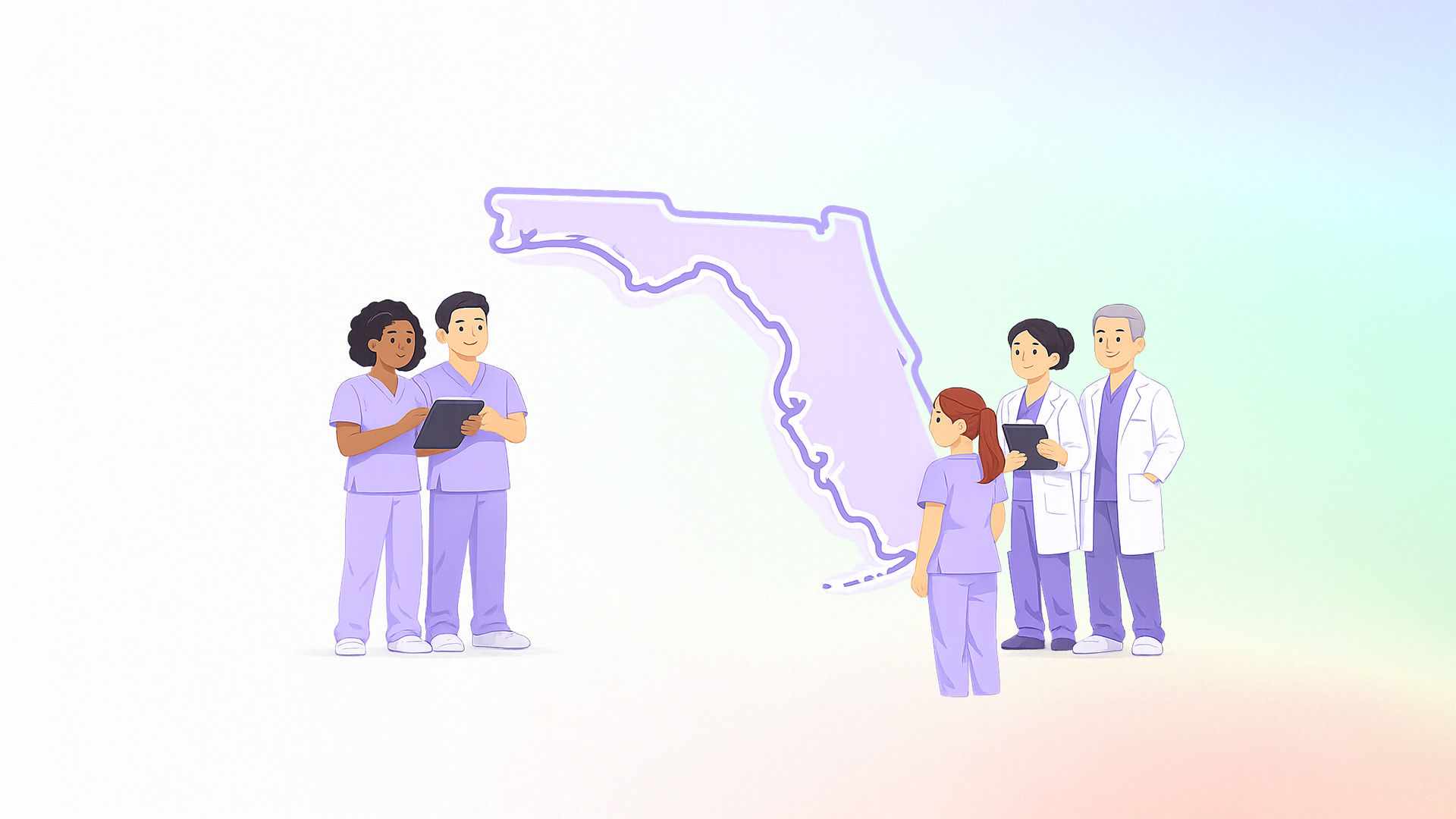- Start early—way early. Begin looking for preceptors 6+ months before your rotation start date to avoid delays or missed graduation deadlines.
- Out-of-state rotations are possible. You may travel for clinicals if you hold a compact RN license—but always confirm your school and state board’s requirements first.
- You’ll need 500–700 clinical hours to graduate. Most must involve direct patient care—falling short means repeating the rotation or delaying graduation.
- Paying for a preceptor is increasingly common. Services like NPHub offer guaranteed placement, vetted preceptors, and take care of all paperwork—saving you time and stress.
- The right preceptor matters. Look for someone experienced, engaged, and willing to teach—your growth depends on more than just hours.
.avif)
As a nurse practitioner student, you're probably feeling a mix of excitement and anxiety right now—and if finding preceptors for your NP clinicals is keeping you up at night, you're not alone.
Completing your clinical rotations is one of the most critical parts of your nurse practitioner program. These clinical placements give you the hands-on experience you need to develop clinical skills and apply what you've learned in real patient care settings. But here's the hard truth: securing clinical sites and finding available preceptors has become one of the biggest roadblocks standing between you and graduation.
You're expected to do it all on your own:
- Find multiple clinical preceptors across different specialties like primary care, pediatrics, and women's health
- Handle all the paperwork and coordinate with clinical coordinators
- Follow up relentlessly with busy healthcare facilities and private clinics
- Balance it all while working full-time, finishing your NP education, and managing everyday life
And the clock is ticking.
If you're already feeling behind or worried about missing your rotation start date, you don't have to do this alone. NPHub connects NP students with vetted, experienced preceptors nationwide—and we handle the entire paperwork process from start to finish. Create your free account now and get matched with vetted preceptors in as little as 30 minutes—we handle all the paperwork so you can graduate on time.
Unlike other clinical placement services or medical programs that provide structured support, many schools leave nurse practitioner students to navigate finding preceptors independently. You're responsible for securing clinical sites, managing contracts, and meeting tight clinical requirements—often with little guidance from faculty members.
The result?
- Months of cold emails to family practices and clinical sites
- Dozens of rejections from overbooked NP preceptors
- Mounting stress as your rotation request deadline approaches
- Risk of delaying graduation, paying extra tuition, or sitting out an entire semester
The struggle has only intensified in recent years. Healthcare facilities are stretched thin, most preceptors are burnt out from the time-consuming nature of teaching, and the competition for nurse practitioner clinicals has never been more intense. Many clinics have reduced or stopped accepting students altogether, making it feel nearly impossible to find someone willing to precept—especially for your first rotation.
But here's the good news: securing quality clinical experiences doesn't have to derail your educational journey.
Whether you're preparing for your first clinical rotation or scrambling to complete your clinical hours at the last minute, this guide will walk you through everything you need to know about NP clinicals:
- When to start finding preceptors (hint: earlier than you think)
- Whether you can travel out of state for clinical practice
- How many clinical hours you need across each specialty track
- What makes a great clinical preceptor who provides constructive feedback
- Whether paying for clinical placement services is worth it
Let's dive in.
When Should I Start Looking for NP Clinical Preceptors?
If you haven't started your search yet, here's the truth: you're probably already behind.
Starting your search for a clinical preceptor as early as possible is crucial to completing your NP clinicals on time. The process of securing clinical placements can take several months—sometimes even longer—depending on your location, specialty, and professional network. Ideally, you should begin finding preceptors at least 6 months before your clinical rotation start date.
Why so early? Here's what you're up against:
The reality of securing clinical sites:
- Most preceptors receive dozens of requests from nurse practitioner students each semester
- Experienced preceptors in high-demand areas like family practices, primary care, and women's health get booked months in advance
- Many private clinics and healthcare facilities require lengthy credentialing and background checks
- All the paperwork between you, your clinical coordinator, and the clinical site can take weeks
Starting early gives you:
- Time to meet your nurse practitioner program's requirements and deadlines
- A buffer if a preceptor cancels or circumstances change
- The ability to focus on finding the right clinical practice for your learning goals
- Better clinical experiences instead of settling for whatever's available
The competition for nurse practitioner clinicals has become intense. With more NP students graduating each year and a limited number of available preceptors, finding quality clinical placements feels like a race. Students who wait until the last minute often struggle to complete their clinical hours on schedule.
The consequences of starting late are real:
- Postponing your rotation by an entire semester
- Delaying graduation and your career as a nurse practitioner
- Paying additional tuition and program fees
- Missing out on developing essential clinical skills with quality preceptors
Already behind schedule? NPHub guarantees placement with experienced preceptors in your specialty. Create your free account and have your rotation fully secured in days—we handle all the paperwork so you stay on track for graduation.
To avoid setbacks, be proactive and persistent in your search. Start by reaching out to faculty members, former professors, and classmates who may know preceptors accepting students. Check with your school's clinical coordinator about potential clinical sites. But if your network isn't producing results quickly enough, don't let time run out.
Will I Be Able to Travel to Another State to Complete My Clinical Rotations?
Yes, as a nurse practitioner student, you may have the option to travel to another state to complete your clinical rotations, but this is often contingent on holding a compact license. The Nurse Licensure Compact (NLC) is an agreement that allows registered nurses (RNs) to have one license that grants them the authority to practice in multiple states, known as “compact states.”
Securing clinical sites is crucial when traveling to another state for clinical rotations. Clinical placement services can assist in finding appropriate clinical sites and ensure they meet educational and regulatory requirements.
As of now, 34 states recognize the multi-state license under the NLC. If you hold a compact license, you can practice in any of these states without needing to obtain a new license. This can be particularly advantageous for NP students who are willing to travel for their clinical rotations but may face limitations within their home state.
To be eligible for a compact license, you must meet several criteria:
- Active RN License: You must be actively licensed as a registered nurse or professional nurse.
- Primary Residence: Your primary residence must be in an NLC state, and you must declare it as your home state.
- State Requirements: You must meet the licensure requirements specific to your state.
However, it’s important to check with both your school and the state nursing board to ensure that your clinical hours completed out of state will be accepted toward your degree and certification requirements.
Additionally, even if you are eligible for a compact license, finding a preceptor out of state for your NP clinicals requires careful planning and coordination, including understanding the legal and regulatory requirements of that state.
Feeling overwhelmed trying to find a clinical preceptor? You’re not alone. Many NP students spend months searching, only to hit dead ends. With NPHub, you can skip the stress and secure a vetted preceptor fast, we handle all the paperwork so you can stay focused on school, work, and life.
How Many Clinical Hours Do I Need to Graduate as an NP Student?
The number of clinical hours required to graduate from a nurse practitioner (NP) program typically ranges from 500 to 700 hours, depending on your program and specialty track. These hours are designed to ensure that you gain the hands-on experience necessary to confidently and competently enter practice.
Clinical hours give you the chance to apply classroom knowledge in real-world settings, interact with patients under the supervision of experienced preceptors, and develop clinical judgment skills that are essential for safe, effective career.
Most programs require that the majority of your clinical hours involve direct patient care, interacting with patients, conducting assessments, developing care plans, and performing procedures. Some schools may also allow a small portion of your hours to include indirect care activities like charting, case discussions, or observing procedures, but check your school’s policy carefully.
If you don’t meet the hour requirement for any rotation, your school may require you to repeat that clinical or delay your graduation until the hours are completed. This is why it's crucial to:
- Start your search for preceptors early
- Stay organized with your paperwork and scheduling
- Communicate often with your clinical coordinator
Can I Complete a Primary Care Clinical Rotation in an Urgent Care Setting?
The short answer: usually no—but it depends on your nurse practitioner program's specific clinicals requirements.
Primary care and urgent care may seem similar in some ways, but they differ significantly in their approach to patient care and the clinical skills they help you develop. Understanding these differences is critical before committing to a clinical site, because choosing the wrong setting could mean repeating the entire rotation.
What makes primary care different:
- Healthcare providers build long-term relationships with patients over months or years
- Focus on managing chronic conditions like diabetes, hypertension, and heart disease
- Emphasis on preventive care, routine health assessments, and wellness visits
- Continuity of care allows you to observe how treatment plans evolve over time
- You develop critical thinking around comprehensive patient histories and holistic care
Family practices exemplify this model—you'll see the same patients return for follow-ups, learn how to adjust medications based on progress, and understand the social determinants affecting their health. This continuity is essential for developing core competencies in primary care nursing practice.
What urgent care offers instead:
- Immediate care for acute, non-life-threatening conditions (sprains, minor infections, flu symptoms)
- Short-term, problem-focused patient interactions
- High patient volume with quick turnover
- Limited opportunity to observe treatment outcomes or provide follow-up care
- Focus on stabilization and referral rather than ongoing management
While urgent care clinical experiences are valuable and help you develop rapid assessment skills, most schools do not accept these hours toward primary care clinical rotation requirements. The hands-on experience in urgent care doesn't provide the depth of knowledge or continuity needed to meet the learning objectives for primary care practice.
Before accepting any clinical placement, always:
- Verify with your clinical coordinator that the site meets your program requirements
- Confirm the specialty aligns with your rotation needs
- Ask whether the preceptor is experienced in teaching nurse practitioner students
- Ensure the clinical practice will give you adequate patient interaction to build clinical skills
Need help finding a clinical site that actually meets your requirements? Create your free account and we'll connect you with experienced preceptors in primary care, pediatrics, women's health, and more—no guesswork, no wasted time.
Don't risk investing weeks into a placement only to find out it doesn't count toward your clinical hours. Get it right the first time.
Where Can I Find Assistance in Looking for a Clinical Preceptor?
Finding a preceptor can be one of the most challenging aspects of your NP education, but fortunately, there are resources available to help. While many schools expect nurse practitioner students to independently secure their own preceptors, some offer varying levels of assistance. A clinical preceptor plays a crucial role in providing clinical experience and developing clinical skills.
- School Resources: Some schools provide support through clinical site coordinators who can assist in finding placements. Additionally, faculty members may have connections or suggestions for potential preceptors and clinical rotations.
- Professional Networks: Leveraging your professional network can be incredibly beneficial. Networking with colleagues, former classmates, or members of professional nursing organizations can lead to valuable connections with potential preceptors so you can at least secure your first clinical rotation.
- Preceptor Recruiting Services: Several companies specialize in connecting nurse practitioner students with preceptors for their NP clinicals. Preceptor matching services like NPHub offer a streamlined process to help you secure a preceptor in a timely manner, managing the paperwork process, vetting preceptors, and other important logistics. While these services typically require a fee, they can save you significant time and stress, especially in high-demand areas or during challenging times like the COVID-19 pandemic.
- Online Platforms and Social Media: Online platforms, forums, and social media groups dedicated to nurse practitioners can also be useful. These platforms often have listings for preceptors or allow students to connect with potential preceptors directly. In many cases, other nurse practitioner students can refer you to preceptors they worked with in the past for their own clinical placement.
What Should I Look for in a Good Preceptor?
Choosing the right preceptor can make all the difference in your clinical experience, it’s not just about fulfilling hours, it’s about learning, growing, and building the confidence to step into your role as a nurse practitioner. A great preceptor is a guide and often a role model you’ll remember long after graduation.
Your preceptor should be clinically competent and experienced in the specialty you’re rotating through, whether it’s family medicine, pediatrics, mental health, or women’s health. But clinical skills alone aren’t enough—they also need to have a willingness to teach.
You want someone who:
- Explains their clinical decision-making
- Encourages you to ask questions
- Provides constructive feedback (even when it’s tough to hear)
- Gives you space to try things with appropriate supervision
If they rush through the day without giving you time to observe, ask, or reflect you’ll struggle to grow.
Preceptors who have worked with students before tend to be more organized, more understanding of your needs, and more familiar with the documentation process. If possible, look for someone who’s precepted NP students in the past, they'll know how to guide you through everything from patient interactions to clinical paperwork.
Should I Pay for a Clinical Preceptor?
The question of whether or not to pay for a clinical preceptor is a significant one that many nurse practitioner students grapple with as they navigate their NP clinicals. The idea of paying for a preceptor may seem unusual or even controversial, but in recent years, it has become increasingly common, especially as the demand for clinical placements has outstripped the supply of willing and available preceptors. Most preceptors these days expect compensation for their time and mentorship too.
The Case for Paying for a Clinical Preceptor
Paying for a clinical preceptor can offer several advantages, particularly in a highly competitive environment where securing a preceptor independently may be difficult or time-consuming. Here are a few reasons why some students choose this route:
- Guaranteed Placement: The most compelling reason to pay for a preceptor is the guarantee of securing a clinical placement within the desired time frame. This can be especially crucial if you are facing tight deadlines for graduation or if your school requires that you secure a preceptor before enrolling in certain courses.
- Reduced Stress and Time Commitment: Finding a preceptor on your own can be a stressful and time-consuming process. Between contacting potential preceptors, waiting for responses, and dealing with rejections, the search can take months. Paying for a service that finds a preceptor for you can significantly reduce this burden, allowing you to focus on your studies and other responsibilities.
- Access to High-Quality Preceptors: Many preceptor services have established relationships with experienced and highly qualified preceptors who are familiar with the educational needs of NP students. By paying for a preceptor, you may gain access to clinical experiences that are more structured and tailored to your learning objectives.
- Streamlined Process: Preceptor services often handle the administrative tasks involved in securing a preceptor, such as paperwork, contracts, and coordination with your school. This can ensure that everything is in place for your NP clinicals to begin on time, without last-minute complications.
Final Thoughts
Completing your NP clinicals is one of the most challenging—and most important—parts of your nurse practitioner program. If you're feeling overwhelmed right now, that's completely normal. Between finding preceptors, securing clinical sites, handling the paperwork process, and balancing everything else in your life, it's a lot.
But here's what you need to remember: thousands of nurse practitioner students have stood exactly where you're standing right now—and they made it through. You will too.
The difference between students who graduate on time and those who don't often comes down to one thing: taking action early and using the right resources.
You have three options moving forward:
Option 1: Keep searching on your own
Continue reaching out to healthcare facilities, private clinics, and family practices. Follow up relentlessly. Handle all the paperwork yourself. It can work—but it takes months, and there are no guarantees.
Option 2: Wait and hope something works out
Cross your fingers that a preceptor responds, that your clinical coordinator finds something, or that a classmate refers you. But every week you wait is another week closer to missing your clinical rotation deadline and potentially delaying graduation.
Option 3: Let NPHub handle it
Get matched with experienced preceptors in your specialty—primary care, pediatrics, women's health, or any other track. We manage the entire paperwork process, guarantee placement in a timely manner, and provide support from your first rotation to graduation. Create your free account now and secure your clinical placement in days, not months.
Stop Stressing. Start Preparing.
You didn't come this far in your NP education to get stuck on finding preceptors. Your clinical experiences should be about developing clinical skills, building confidence with patient care, and preparing for your career as a nurse practitioner—not spending hours cold-calling clinics or stressing about deadlines.
Ready to take control of your clinical placements?
👉Start your preceptor search now – browse 2,000+ available preceptors
👉 Create your free account – get matched with the perfect preceptor
👉Read more student success stories – see how other NP students secured their clinicals
Whether this is your first clinical rotation or your fourth, NPHub is here to guide you from start to finish. We'll help you meet your nurse practitioner program requirements, stay on track for graduation, and eliminate the anxiety that comes with finding preceptors.
Your future as a nurse practitioner is waiting. Don't let clinical placements hold you back another day.
Key Definitions - For NP Clinical Rotations
NP clinical rotations
Your required hands-on training blocks where you learn in real patient-care settings under a licensed provider.
Clinical placement
The specific site (clinic, hospital, urgent care, etc.) where your rotation happens.
Preceptor
The licensed clinician who supervises you, teaches you in real time, and signs off on your clinical performance.
Clinical hours
The total hours your program requires you to complete in rotation. Most programs fall around 500–700 hours.
Direct patient care hours
Hours spent actively working with patients (assessments, plans, procedures, education). These usually make up most of your required hours.
Indirect clinical hours
Hours tied to care but not face-to-face, like charting, case discussions, or observing. Some schools allow a small portion of these.
Clinical specialty
The focus area of your rotation, like family medicine, pediatrics, women’s health, mental health, or primary care.
Primary care rotation
A rotation built around continuity of care, preventive care, chronic condition management, and long-term patient relationships.
Urgent care setting
A fast-paced environment focused on short-term, problem-based visits for acute, non-life-threatening issues (usually not accepted as primary care by many programs).
Clinical coordinator
The school contact who approves sites, verifies requirements, and helps you stay aligned with program rules and deadlines.
School requirements
Your program’s rules for what counts: eligible preceptor credentials, site type, patient population, hour distribution, and documentation.
Nurse Licensure Compact (NLC)
An agreement that allows RNs in certain states to practice across other “compact states” under one multistate license.
Compact license
The multistate RN license that may make out-of-state clinicals easier, but you still need school and board approval.
State board of nursing
The state authority that regulates nursing practice and may impact what’s allowed for clinical training across state lines.
Preceptor matching service
A service that helps students find placements by connecting them with vetted preceptors and often helping with paperwork and coordination.
About the author
- NPHub Staff
At NPHub, we live and breathe clinical placements. Our team is made up of nurse practitioners, clinical coordinators, placement advisors, and former students who’ve been through the process themselves. We work directly with NP students across the country to help them secure high-quality preceptorships and graduate on time with confidence. - Last updated
November 6th, 2025 - Fact-checked by
NPHub Clinical Placement Experts & Student Support Team - Sources and references
Find a preceptor who cares with NPHub
Book a rotation.webp)








.webp)


.webp)



%20(3)%20(2).svg)
.webp)